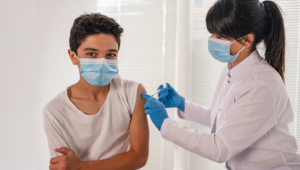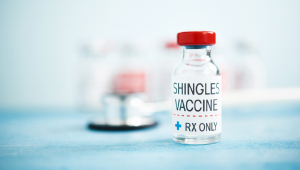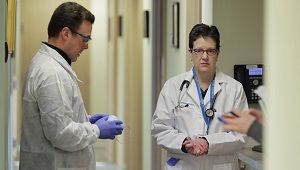Lisa A. Jackson, MD, MPH
Biography
Lisa A. Jackson, MD, MPH, is an internist and infectious disease epidemiologist who has conducted clinical and epidemiologic studies of vaccine safety and efficacy since 1991.
Dr. Jackson is the principal investigator (PI) of KPWHRI’s Vaccine and Treatment Evaluation Unit — one of 10 network sites that the National Institutes of Health (NIH) sponsors. In this role, she leads the phase 1 clinical trial of the COVID-19 vaccine co-developed by Moderna and NIH. Launched in March 2020, this trial was the first in the world to begin testing a COVID-19 vaccine. She is also leading the phase 3 clinical trials of the COVID-19 vaccines developed by Moderna and NIH and by Janssen Pharmaceutical Companies, part of Johnson & Johnson, at KPWHRI.
Additionally, Dr. Jackson serves as KPWHRI’s principal investigator in the Vaccine Safety Datalink Project (VSDP). Sponsored by the Centers for Disease Control and Prevention (CDC), VSDP conducts ongoing research on the safety of licensed vaccines in routine use.
Dr. Jackson has written more than 200 peer-reviewed publications and 14 book chapters. She is a past member of the Food and Drug Administration’s Vaccines and Related Biological Products Advisory Committee and the National Vaccine Program Office’s National Vaccine Advisory Committee.
After receiving her medical degree from the University of Virginia School of Medicine, in Charlottesville, Dr. Jackson earned her Master of Public Health (MPH) degree at the University of Washington (UW) School of Public Health. She completed her internal medicine residency training at the UW School of Medicine and served as an epidemic intelligence officer and preventive medicine resident at the CDC.
Research interests and experience
Vaccines & Infectious Diseases
Vaccine safety; COVID-19 vaccine safety and effectiveness; influenza vaccine effectiveness in the elderly; methodologic issues in vaccine effectiveness evaluations; pneumococcal polysaccharide vaccine effectiveness; pneumococcal conjugate vaccine immunogenicity in the elderly; epidemiology of E. coli bacteremia; epidemiology of community-acquired pneumonia
Recent publications
Dawood FS, Chung JR, Kim SS, Zimmerman RK, Nowalk MP, Jackson ML, Jackson LA, Monto AS, Martin ET, Belongia EA, McLean HQ, Gaglani M, Dunnigan K, Foust A, Sessions W, DaSilva J, Le S, Stark T, Kondor RJ, Barnes JR, Wentworth DE, Brammer L, Fry AM, Patel MM, Flannery B Interim Estimates of 2019-20 Seasonal Influenza Vaccine Effectiveness - United States, February 2020 2020 Feb 21;69(7):177-182. doi: 10.15585/mmwr.mm6907a1. Epub 2020-02-21. PubMed
Anderson EJ, Lai L, Wrammert J, Kabbani S, Xu Y, Priyamvada L, Hill H, Goll JB, Jensen TL, Kao C, Yildirim I, Rouphael N, Jackson L, Mulligan MJ Plasmablast, Memory B Cell, CD4+ T Cell, and Circulating Follicular Helper T Cell Responses to a Non-Replicating Modified Vaccinia Ankara Vaccine 2020 Feb 6;8(1). doi: 10.3390/vaccines8010069. Epub 2020-02-06. PubMed
Yu W, Zheng C, Xie F, Chen W, Mercado C, Sy LS, Qian L, Glenn S, Tseng HF, Lee G, Duffy J, McNeil MM, Daley MF, Crane B, McLean HQ, Jackson LA, Jacobsen SJ The use of natural language processing to identify vaccine-related anaphylaxis at five health care systems in the Vaccine Safety Datalink 2020 Feb;29(2):182-188. doi: 10.1002/pds.4919. Epub 2019-12-03. PubMed
Flannery B, Kondor RJG, Chung JR, Gaglani M, Reis M, Zimmerman RK, Nowalk MP, Jackson ML, Jackson LA, Monto AS, Martin ET, Belongia EA, McLean HQ, Kim SS, Blanton L, Kniss K, Budd AP, Brammer L, Stark TJ, Barnes JR, Wentworth DE, Fry AM, Patel M Spread of antigenically drifted influenza A(H3N2) viruses and vaccine effectiveness in the United States during the 2018-2019 season 2020 Jan;221(1):8-15. doi: 10.1093/infdis/jiz543. PubMed
Ahmed F, Kim S, Nowalk MP, King JP, VanWormer JJ, Gaglani M, Zimmerman RK, Bear T, Jackson ML, Jackson LA, Martin E, Cheng C, Flannery B, Chung JR, Uzicanin A Paid Leave and Access to Telework as Work Attendance Determinants during Acute Respiratory Illness, United States, 2017-2018 2020 Jan;26(1). doi: 10.3201/eid2601.190743. PubMed
Donahue JG, Kieke BA, Lewis EM, Weintraub ES, Hanson KE, McClure DL, Vickers ER, Gee J, Daley MF, DeStefano F, Hechter RC, Jackson LA, Klein NP, Naleway AL, Nelson JC, Belongia EA Near Real-Time Surveillance to Assess the Safety of the 9-Valent Human Papillomavirus Vaccine 2019 Dec;144(6). doi: 10.1542/peds.2019-1808. Epub 2019-11-18. PubMed
Donahue JG, Kieke BA, King JP, Mascola MA, Shimabukuro TT, DeStefano F, Hanson KE, McClure DL, Olaiya O, Glanz JM, Hechter RC, Irving SA, Jackson LA, Klein NP, Naleway AL, Weintraub ES, Belongia EA Inactivated influenza vaccine and spontaneous abortion in the Vaccine Safety Datalink in 2012-13, 2013-14, and 2014-15 2019 Oct 16;37(44):6673-6681. doi: 10.1016/j.vaccine.2019.09.035. Epub 2019-09-17. PubMed
Groom HC, Smith N, Irving SA, Koppolu P, Vazquez-Benitez G, Kharbanda EO, Daley MF, Donahue JG, Getahun D, Jackson LA, Klein NP, McCarthy NL, Nordin JD, Panagiotakopoulos L, Naleway AL Uptake and safety of hepatitis A vaccination during pregnancy: A Vaccine Safety Datalink study 2019 Oct 16;37(44):6648-6655. doi: 10.1016/j.vaccine.2019.09.043. Epub 2019-09-20. PubMed
Cook AJ, Wellman RD, Marsh T, Shoaibi A, Tiwari R, Nguyen M, Boudreau D, Weintraub ES, Jackson L, Nelson JC Applying sequential surveillance methods that use regression adjustment or weighting to control confounding in a multi-site, rare event, distributed setting: Part 2 In-Depth Example of a re-analysis of the measles-mumps-rubella-varicella combination vacci 2019 Sep;113:114-122. doi: 10.1016/j.jclinepi.2019.04.019. Epub 2019-05-02. PubMed
Flannery B, Chung JR, Monto AS, Martin ET, Belongia EA, McLean HQ, Gaglani M, Murthy K, Zimmerman RK, Nowalk MP, Jackson ML, Jackson LA, Rolfes MA, Spencer S, Fry AM, US Flu VE Investigators Influenza Vaccine Effectiveness in the United States during the 2016-2017 Season 2019 May 17;68(11):1798-1806. doi: 10.1093/cid/ciy775. PubMed
News

Vaccine program recruiting volunteers in Seattle area
KPWHRI’s vaccine registry was the first to enroll participants in a clinical trial of a COVID-19 vaccine.
News

Clinical trial will evaluate mpox vaccine for adolescents
The NIH-sponsored trial will help inform decisions about vaccine approval for 12- to 17-year-olds.
Research

New study confirms safety of shingles vaccine
KPWHRI researchers analyzed data from more than 640,000 vaccine doses to understand risk of severe reactions.
Research

‘Fighting back’ against COVID-19: Remembering a historic trial
Lisa Jackson, MD, MPH, Kaiser Permanente Washington senior investigator, recounts the genesis of a groundbreaking vaccine.



